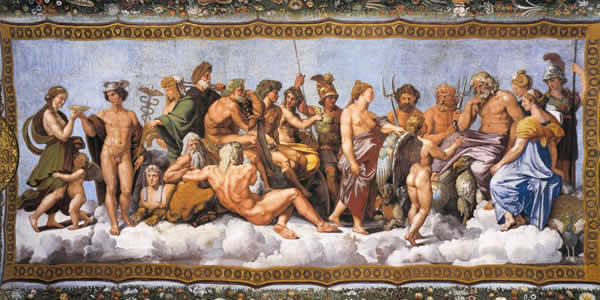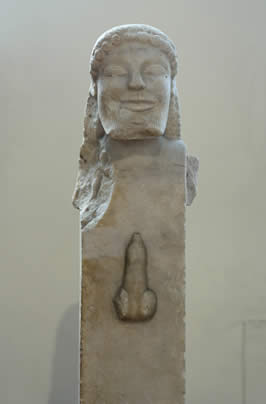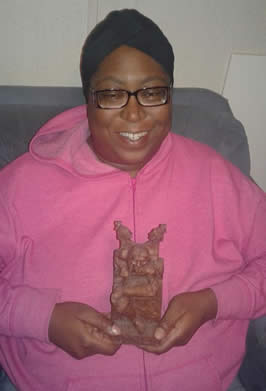[Author’s Note: Despite my dismay at the recent election results, I will not dwell on them here. Other authors here at Patheos have discussed them much better than I could. Instead, I’ll focus on what we can do to help make our communities better able to weather this new environment.]
The All Gods Event is a ritual I created a few years ago when I was involved in a lot of intrafaith work in the Bay Area. I felt then, as I do now, that politics being what it is, it is even more important for us to pull together and support each other, because the upcoming political regime will not. It was very important for me that this happen not just on the community level, but on the spiritual level as well.
Believe it or not, unless we are part of some very rare family tradition, we modern Heathens are part of the Pagan movement. It’s in our best interest to get along with other Pagan traditions and groups. As a devotional polytheist, I think it’s in our best interest to get along with their Gods, as well. (Also, it makes me happy to see different deities being presented and honored by those who love them. At Heathen events, all I usually see are the Aesir and Vanir gods.)

Welcome to the Party

The key to this kind of event is open mindedness and acceptance. Any person who is willing to come and respectfully honor or make space for other deities as well as their own should be invited. (This is not Sleeping Beauty; no Gods should be “left out” because they have a bad rep.) This is a great way to get to know those people in your larger Pagan community whom you know of but have never worked with, because you’re in different traditions or honor different Gods. I have found that getting to know someone through their devotion to their deity or their spiritual tradition can be a powerful way to grow understanding and empathy among community members.
The first time I ran this event, individuals from many groups showed up, representing we Gods from several different pantheons. At the beginning of the event, I gave a lengthy reminder to all and sundry that given that all the old pantheons honored hospitality, I expected all who attended, both human and divine, to honor that hospitality and act as a good guest. All of the deities who showed up played well with others, and no notable problems arose.
The Gods we called that day were representative of the people who attended, and for the most part they were an easy-going lot. We honored Freya, Hermes, Dionysus, Ariadne, Aphrodite, Hreda, Odin, Loki, Njord, Freyr, Nerthus, and a few others as well. Many off-color jokes were told, much food and drink was shared, eloquent speeches made and libations poured, and many new human connections made and old ones strengthened. Though I would have liked to include a few more pantheons, the event was a success. The general consensus was that the Gods represented were happy to be included and got a kick out of being honored in front of people other than their usual worshipers.

Our offerings took many forms, as well: food, drink, song, stories, and jokes, including an unexpected–but apparently historically appropriate–round of Hermes’ dick jokes: “Hermes’s dick is so big, every time he gets a hardon there’s a solar eclipse,” etc. (He is represented by big, phallic hermes, after all). Most importantly, though, together we created a safe space where all of our Gods could be honored respectfully.
How It Works
Basically, I brainstormed the details of the original event with a few friends; booked a great campsite for the event; and invited all of the pagan/polytheist groups and people that I knew. Being a unrepentant idealist, I am generally sure that Everything is Going to Work Out Just Fine most of the time, but even so, I’m pay close attention to what works and what doesn’t. I took away from the experience couple of suggestions for the next time I run this event. So, for those who would like to try this at home, here’s my advice:
- First, create a set list. To the extent that is possible, get an idea of who will be there and which Gods will be represented. Make a timeline and stick to it. This will help avoid confusion, wasted time, and hurt feelings. Because several attendees had scheduling conflicts, I ran this event as if it were an Open House, with participants rolling in at different times; however, this caused more confusion than anything else. I’m still undecided on whether the set list should be organized by pantheon/trad or not; personally, I liked it best when we skipped from pantheon to pantheon.
- Second, avoid politics. I strongly recommend that this event be made up of individuals representing their Gods rather than people representing a group. It’s not about the politics and it’s not about the personalities; it’s about coming together as a community to help honor and respect each others’ Gods.
- Third, invest the money to get a decent location for the event. Though it’s unlikely that you’ll find a place with a fire pit, a running spring, an accessible bog, a beach, and a sauna, it’s a good goal to aim for. I ended up scoring a group campsite in a public park on a marsh next to the Bay. It had a huge fire pit, ample space for food prep and grilling, plenty of benches and picnic tables, running water, and a permanent restroom. (Unfortunately, it also had a lot of outsiders walking through or near it, so I, as the person running it, got to spend a lot of time and energy on the landtaking part of the ritual.)
-

“Everyone’s invited to the party, even Loki.” Loki’s Carrier Pigeon, Gari Farmer, holding her statue of Loki / Photo by Gari Farmer / Used with permission Which leads me to my fourth recommendation: Demarcate and purify the crap out of that space before you get started. Do it before the participants have even gathered and have someone designated specifically to hold the larger space. (Not ward the space, per se; but hold the space, keeping it as sacred space set aside for all to attend.) Also, since each tradition (and even each person) has their own way of setting and sacralizing space, when it is their turn to honor their Gods, let people set/cleanse their space within the larger space as they wish. As far as I could tell, the different ways of setting space did not negatively impact each other.
- Finally, five: Make this a event a “low-woo” event; i.e., no trancing or journeying or intense energy work. I can see different versions of this event being higher woo or with a specific focus (such as trancing a deity), but the low-woo restriction allows the focus to remain on honoring the Gods and allows as many people to attend as possible. An event like this is meant to be a community service event. Some people are just not interested in or prepared to participate in a high-woo event, but they still have the right to come to the table and worship their Gods in the way that they see fit.
We Are the World
I’d love to see this ritual (or something similar) happen across our nation. The Gods—the large and the small ones; the local and the universal ones; the Gods of war and peace and art and poetry— They are interested in what happens here on Earth. In the times to come, they are the bedrocks of support that we will need to overcome the challenges facing us in the future. They are our most powerful allies, healers, and helpers. Think of how much powerful we and They can be when we honor them together.

Patheos Pagan on Facebook.

the Agora on Facebook
Happily Heathen is posted on alternate Fridays here at the Agora. Subscribe by RSS or e-mail!
Please use the links to the right to keep on top of activities here on the Agora as well as across the entire Patheos Pagan channel.

















